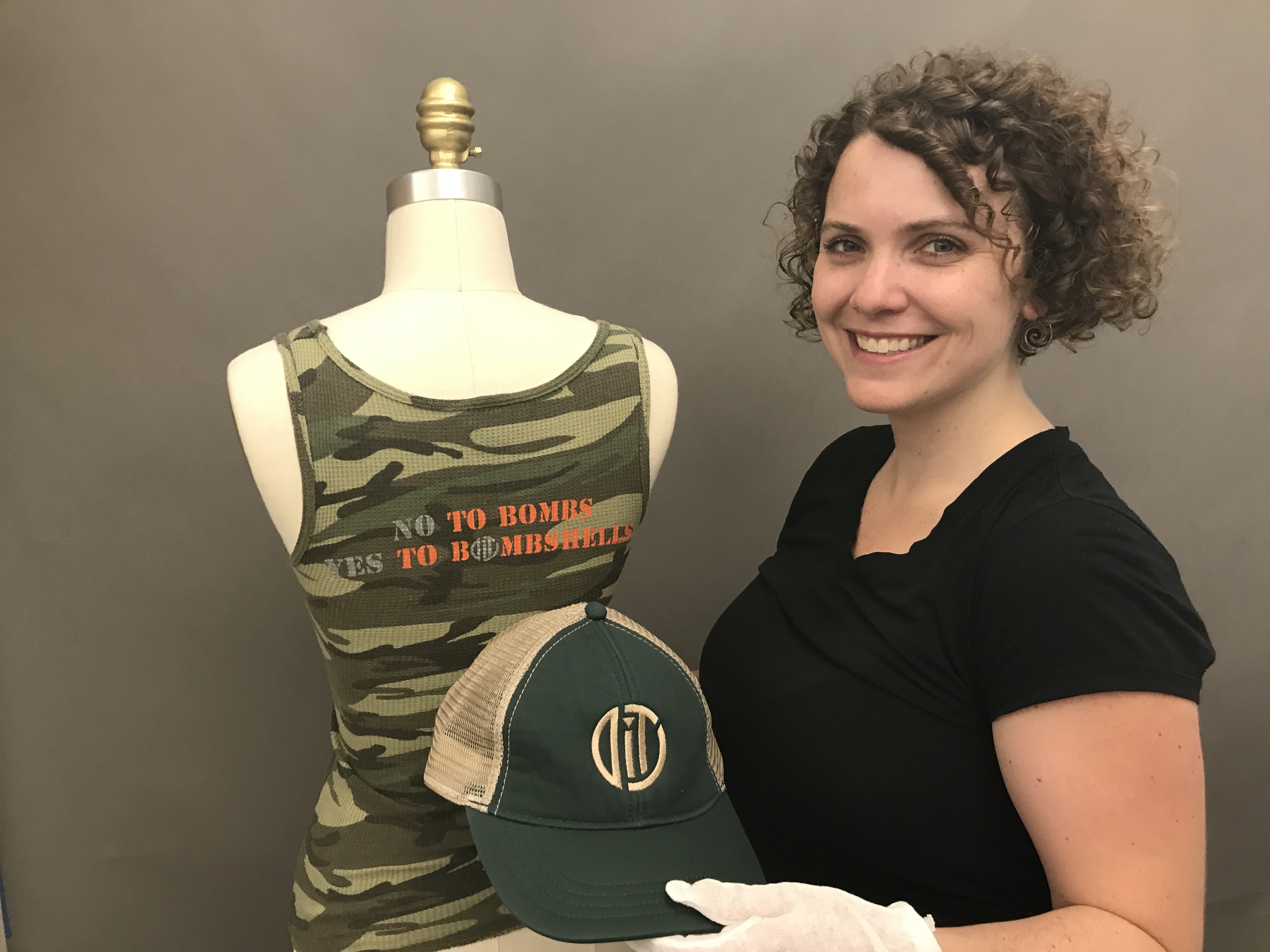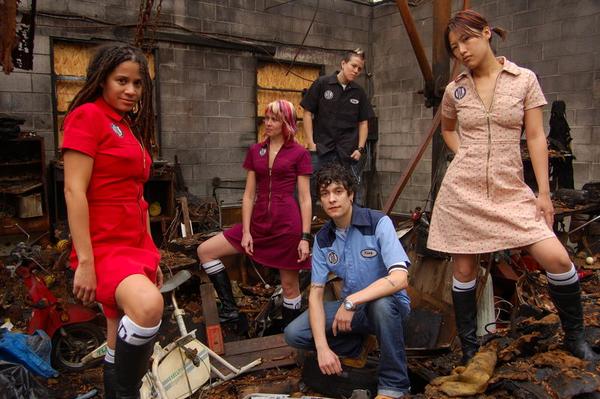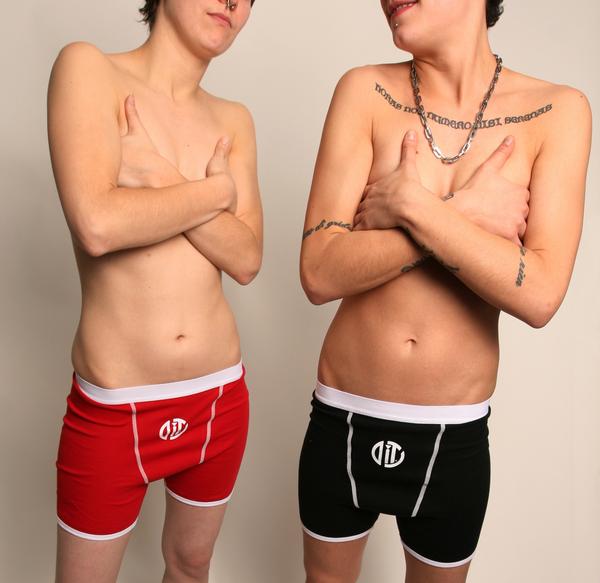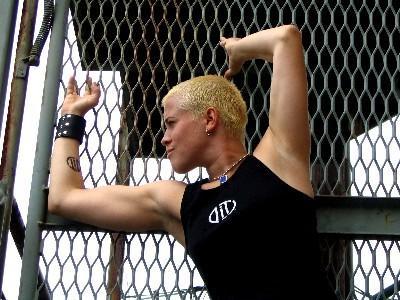Blog post by Denise N. Green ’07

It was the summer of 2006 and I was in the thick of curating a costume exhibition about Ithaca’s fashioned youth subcultures when I met Nicky Cutler. Nicky had started a clothing brand, DITC (Dykes in the City), and back in 2006 you couldn’t throw a rock in downtown Ithaca without hitting someone sporting their graphic logo on a hoodie, trucker hat, baseball cap, tank, touque, or button-down. That summer I purchased two items for the Cornell Costume & Textile Collection: a camouflage tank top with a silk screen print of a woman holding a bleeding bomb and said “No to Bombs / Yes to Bombshells” and a green trucker hat with the DITC logo embroidered across the front. Years later I reconnected with Nicky, who generously agreed to be interviewed about the brand. Nicky has since moved on from DITC, which operated 2004 – 2011, but continues to work in fashion as a shopkeeper of Goorin Bros. Hat Shop in the French Quarter, New Orleans.

Why did you start the clothing brand, Dykes in the City? What was your inspiration?
I began DITC for a few reasons. When I was living in Baltimore I had a group of friends and there were six of us and we called ourselves Dykes in the City (DITCs). We did a lot of fun things around town together and just wanted to name our little group. When we all moved away from each other we still had that solid friendship through our DITC name.
When the group came to visit me out in Ithaca we all decided to make t-shirts that said DITC. We wore them proudly and they started to get a lot of attention every where we went. All these people wanted one once I told them what it stood for. It was interesting to witness and it struck an idea in my head. I was teaching at the time and had always wanted to do something for the LGBT community (obviously now there are many more letters, but at that time we were using LGBT). So, I went out on a limb and decided to try out an idea: to start this clothing line, DITC (Dykes in the City). I loved the concept of DITC so much. The word dyke was still considered a disparaging term for a lesbian at the time. I wanted to reclaim the language of that word. My friends were proud to be dykes. I wanted to make a difference in the lives of people in my community and instill a sense of belonging and pride in being exactly who we were at the time. Women were craving that so badly. We needed a way to unite. Dykes in the City was huge for a lot of people who otherwise did not have a common ground. It was a way to connect with dykes in the know.


We have a couple pieces in the Cornell Costume and Textile Collection: one of the trucker hats with DITC logo and a camouflage tank with a screen print ‘no to bombs, yes to bombshells.’ Can you talk about the role of politics in your design work?
The trucker hats were a trendy hat choice. Dykes often set the trends in fashion and that was my idea of the beginning of a new type of hat trend. Our logo was important in our branding effort and the first few years we were completely logo focused, so more and more people began to know who we were nationwide. I traveled to over 35 states selling our wares and branding our company. East to west coast! It was an amazing time.
We did not intend to be a super political company, but it is sometimes out of your control. Just being a dyke at the time made one political. It was the Bush era and the Iraq war: we did a line that was a military based fashion line and one of the shirts was camouflaged and screen printed with “no to bombs yes to bombshells.” It was a way of saying we were lovers not fighters. We love our femmes, we don’t love war. A play on words. It went over pretty well with the community, as did our “do ask do tell” military jackets and tank tops. They were a huge statement and we were the first ones to put something like that out there. We supported our troops being able to be open about who they are while serving this country. It was undeniably the most politically charged line we ever put out there and it was very popular.

How did your community identify with your clothes and how did your designs change over time?
Our consumers and community was made up of LGBT and allies; they all identified with DITC. I had family members of dykes and friends of dykes support our line. The clothing was fresh and comfortable to wear. I sold mostly at pride festivals and women’s festivals all over the country, so mostly women (butch and femme alike) wore our clothing; however, I have seen several men wearing our hats. We had a big skater appeal with our choices.
Our line changed a lot over the course of 7 years. We did a lot of logo shirts in the beginning and then our lines shifted to aesthetic themes. For example, we had a workwear theme where we put out work dresses in really durable materials. They were handmade by a woman in Ithaca, New York. We had blue collar work shirts—like those you’d see in a mechanic shop—with labels like “boi,” daddy,” “femme,” “king,” and “butch.” Those were wildly popular. We had the military line I’ve already discussed, and we had a rockabilly-style 1950s line with handmade pencil skirts and screen-printed vests. Along with Erin, my partner at the time, we thought of the concepts for each line and developed the ideas into aesthetics. Sometimes our third partner, Denise, would design a graphic and sometimes our seamstress would design a pattern for the handmade goods. This went on for years. Erin and I broke up and I still did the business along with Denise. My identity started to change as the years and the times pushed forward and I began to question my own identity as a dyke. I could no longer support the name of my own company because my own thoughts of myself had altered so much so I decided to end after the 2011 season. I don’t identify as dyke anymore so I felt that the time of the company had run its course.

What were your successes but also, what challenges did you face in design, production, and distribution?
I felt like successes came all the time. I traveled all over the country meeting like-minded amazing people. I think I was probably the happiest I will ever be in those years being on the road, changing the world, making people happy and feeling accepted for being just who they are. I made life long friends and have places to stay in all different states. It was a beautiful time for me in my life to actually be passionate about my work. I could never have a job I didn’t feel passionate about at this point in my life. I just wouldn’t be able to do it.
Design was difficult and I wish I had more skills in this area. I worked to my full potential but if I had the money to have an actual artistic designer at the time I think it would have been a much different story. But, we did the best we could. Thanks to clothing companies that sold clothing in bulk, which we could print on, we had the opportunity to design without going overseas. If we had become bigger I would have needed to research more about manufacturing worldwide. But, I kept the company moderately small. We had a great website thanks to Denise that we were able to take orders and get things out in a reasonable time span. I handled all of that. I basically handled pretty much everything except for some basic design work and the website.

We did so many wonderful things. We overturned a law along with dykes on bikes in my first year of business stating that a business could not use the term dyke in a trademark because it was considered a disparaging term for a lesbian. That was pretty epic. Our clothing was featured in Curve, Velvet Park and other magazines. Our designs were featured on the L word and a few other smaller TV shows on the Her network. We had fundraisers and fashion shows and pop up shops and parties and all sorts of amazing things happen in those years.
Dykes in the City was definitely my most creative years. I was able to impact people through the medium of fashion.
Any last thoughts?
Thanks for interviewing me. I forgot what all this stood for. It seems to get lost now that it has been over. It sometimes feels like just a distant memory in the new challenges we face. But, being a Dyke was a big challenge for people in my generation. And my company helped to pave the way for inner strength and the beauty of being a dyke.
This is the right blog for anyone who wants to find out about this topic. You realize so much it’s almost hard to argue with you (not that I actually would want HaHa). You definitely put a new spin on a topic that’s been written about for years. Great stuff, just great!
Screen printing Vancouver